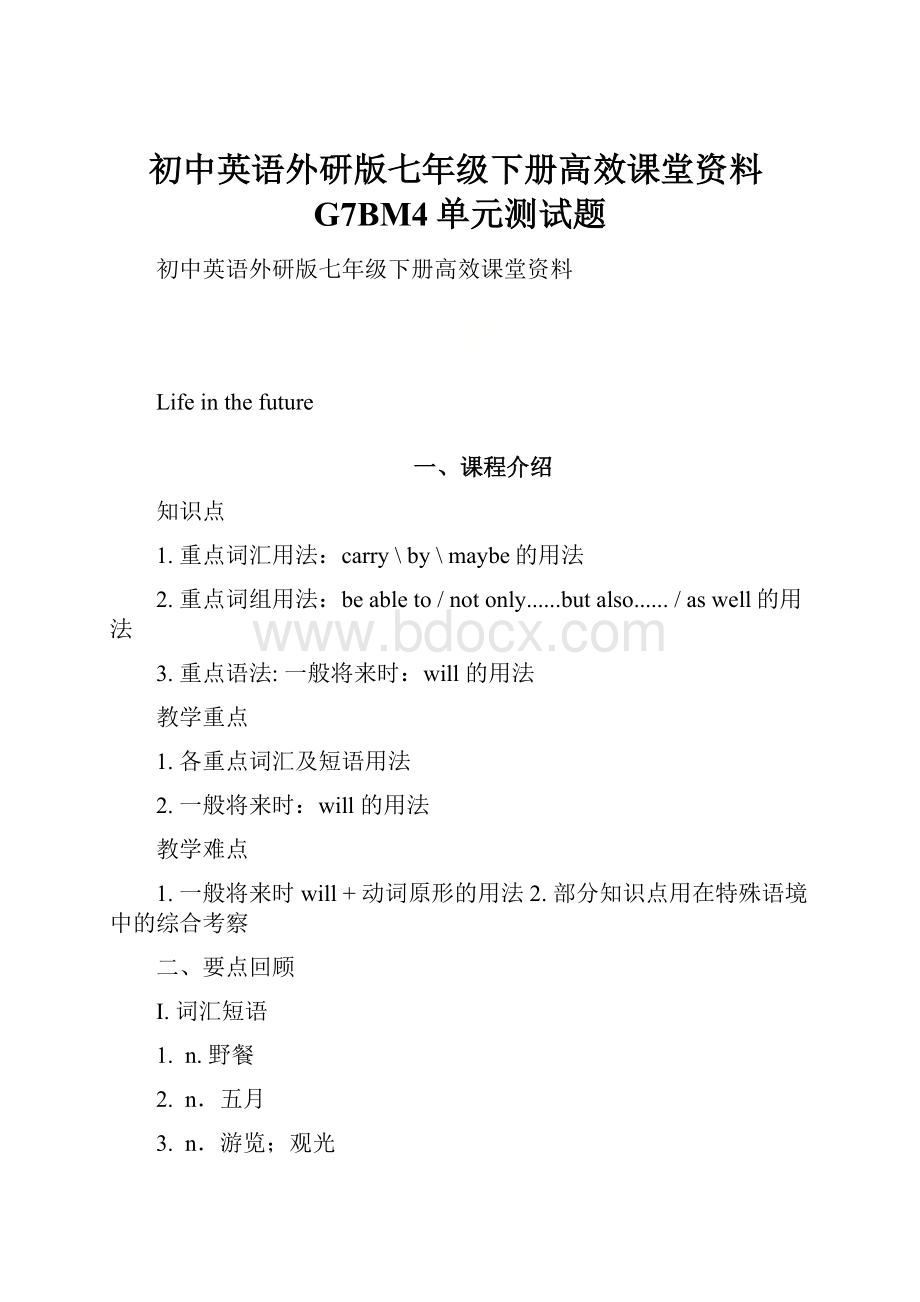初中英语外研版七年级下册高效课堂资料G7BM4单元测试题.docx
《初中英语外研版七年级下册高效课堂资料G7BM4单元测试题.docx》由会员分享,可在线阅读,更多相关《初中英语外研版七年级下册高效课堂资料G7BM4单元测试题.docx(19页珍藏版)》请在冰豆网上搜索。

初中英语外研版七年级下册高效课堂资料G7BM4单元测试题
初中英语外研版七年级下册高效课堂资料
Lifeinthefuture
一、课程介绍
知识点
1.重点词汇用法:
carry\by\maybe的用法
2.重点词组用法:
beableto/notonly......butalso....../aswell的用法
3.重点语法:
一般将来时:
will的用法
教学重点
1.各重点词汇及短语用法
2.一般将来时:
will的用法
教学难点
1.一般将来时will+动词原形的用法2.部分知识点用在特殊语境中的综合考察
二、要点回顾
Ⅰ.词汇短语
1.n.野餐
2.n.五月
3.n.游览;观光
4.v.为......喝彩
5.n.步行
6.adj.傻气的
7.n.垃圾
8.pron.我自己
9.pron.没有人
10._________v.希望
11._________n.乐趣
12. 复习
13. 盼望
14. 交朋友
15. 过得愉快
16. 散步
17. 观光
【答案】1.picnic2.May 3.sightseeing4.cheer5.walk
6.silly 7.litter 8.myself 9.nobody10.hope
11.fun12.goover 13.lookforwardto 14.makefriends15.enjoyoneself
16.takeawalk17.gosightseeing
Ⅱ.活用句型
翻译下列句子
1.这个周六我们要去观光。
_________________________________________________.
2.让我们去散散步吧。
_________________________________________________.
3.我盼望着春节的到来。
___________________________________________________.
【答案】
1.WearegoingtogosightseeingthisSaturday.
2.Let’stakeawalk.
3.IamlookingforwardtotheSpringFestival.
三、知识精要
1)词汇
chalk
n.粉笔
future
n.将来
ruler
n.尺子
carry
v.拿;带
everything
pron.每件事
change
v.改变;变化
life
n.生活;生命
need
v.需要
will
v.aux.将要
by
prep.用;靠;乘
maybe
adv.也许
level
n.水平
question
n.问题
able
adj.能够......的
more
adj.更多的
land
n.陆地
free
adj.空闲的
machine
n.机器
air
n.空气
rain
n.雨水
sea
n.海洋
robot
n.机器人
space
n.太空
wind
n.风
traffic
n.交通
true
adj.真的
bike
n.自行车
car
n.汽车
cheap
adj.便宜的
into
prep.进入......里面
everywhere
adv.到处
long
adj.长的
heavy
adj.繁重的
working
adj.(有关)工作的
light
adj.轻松的
hour
n.小时
easy
adj.容易的
short
adj.短的;矮的
rise
v.升起
trafficjam
交通堵塞
2)词组
inthefuture
在未来
cometrue
实现
beableto
能够做
notonly......butalso
不但......而且
not......anymore
不再
aswell
和;也;又
3)语法
【语法点一】“in+段时间”的用法
in+段时间,表示“在......多久之后”,句子要用一般将来时。
【语法点二】“用......”的英文表达方法
by
表示方法、手段、交通工具
Shemadeushappybydancing.
with
表示用具体的工具
Youmaywritewithapen.
in
表示用语言,材料,文字等
Pleasewritealetterwithapen.
on/over
表示使用通讯工具
Ifyouknowit,pleasetellusonthephone.
【语法点三】一般将来时:
will的用法
如果我们想要描述未来的事情或者表达对将来的预测,我们可以用will+动词原形。
四、要点讲练
【要点1】carry的用法
carry 指“随身携带”(如搬,提,拿,扛,抬,抱,背,带等),不具体说明来去的方向,有时含有沉重或麻烦之意。
如:
Shecarriedherbabyinherarms. 她把婴儿抱在怀里。
注:
bring/carry/take辨析
bring“带来”,表示将人或物“带到/拿到自己(说话者)所在的位置”,常与here,me搭配。
take“带走”,表示将人或物“拿开/带离自己(说话者)所在的位置”常与there,away搭配。
carry“用手或身体搬运”,不强调动作的方向。
表示“捧”,“抱”,“提”,“运”,“携带”等。
如:
Taketheseplatesawaytothekitchen,please.请把这些盘子拿到厨房去。
Howdoyoucarryallthatfood?
你是怎样带走所有的食物的?
Don’tforgettobringyourhomeworkhere.不要忘记把你的家庭作业带到这儿。
【例题】
(2017·广州)
1.Hello,John.Couldyouhelpme________thebookstotheclassroom?
A.carryB.tobringC.takingD.carrying
【解析】句意:
约翰,你能帮助我把书搬到/带到教室吗?
take带去;bring带来;carry搬,扛。
结合句意,carry和take都可以说通,但是根据形式helpsb(to)dosth可知是选择carry。
故选A。
【答案】A
【即学即用】
1.用carry的正确形式填空
①Lindaoften_______abigdictionary.
②Tomwill______thesebookstotheclassroom.
【答案】①carries ②carry
2.用carry翻译下列句子
1.他们需要四个男孩来搬这些家具。
2.这个箱子太重而不能搬动。
【答案】1.Theyneedfourboystocarrythesefurniture.2.Theboxistooheavytocarryit.
【知识拓展】
关于carry的短语
carryout执行;实行;贯彻;实现;完成carryon开展;维持;继续
carrythrough帮(某人)渡过难关;使(某人)保持勇气carryabout随身携带
【要点2】by的用法
1.表示方式、方法、手段等,后常接无冠词的名词或动名词,意为“通过;靠;用”。
如:
Hemadealivingbyteaching.他以教书为生。
2.表示交通路线或工具,后接名词不用冠词,意为“乘;坐”。
如:
gobybus/plane/train乘汽车(飞机、火车)去
3.用于被动语态的句子中,表示动作的执行者,意为“被;由”。
如:
Hewaspraisedby the teacher.他受到了老师的表扬。
4..表示时间,意为“到……时(为止”或“不迟于……”)。
如:
By the timehewasten,hehadlearntabout1,000Englishwords.到十岁时,他已学了约一千个英语单词。
5.表示位置,意为“在近旁;在……旁边”。
如:
Thereisapumpingstationbytheriver.河边有个抽水站。
【例题】
(2016·太原)
Lindausuallysendsherhomeworktoherteacher_______email.
A.byB.toC.onD.for
【解析】本题考查介词的用法。
byemail为固定短语,表示通过邮件,也符合by表示通过某种方式的用法。
故选A。
【答案】A
【即学即用】
1.用by翻译下列句子
①你只要跟别人聊聊这个问题,你就已经解决了问题的一半。
②请于12月20号周五前以书面形式回复这封信。
③所有的明星都受到了年轻人的仰慕。
【答案】①Youarehalfwaytosolvingaproblemjustbytalkingtosomeoneaboutit.
②PleasereplyinwritingtothisletterbyFriday,December20th.
③Allthestarsarelookeduptobytheyoung.
【要点3】notonly......butalso的用法
1.notonly...butalso... 表示“不仅……而且”,用于连接两个性质相同的词或短语。
如:
Shelikesnotonlymusicbutalsosport. 她不但喜欢音乐而且喜欢运动。
2.notonly.....butalso......连接两个主语时,谓语动词的数原则上与其相近的主语保持一致。
如:
Notonlythestudentsbutalsotheirteacherisenjoyingthefilm. 不仅学生们在欣赏这部影片,他们的老师也在欣赏这部影片。
【例题】
(2017·长春)
NotonlyLiMingbutalsoI_______students.
A.isB.areC.amD.were
【解析】本题考查notonly.....butalso......做主语时,主谓一致的内容。
notonly…butalso连接两个主语时,谓语动词的数原则上与其相近的主语保持一致,主语是I,因此是使用am,故选C。
【答案】C
【即学即用】
用notonly......butalso.....翻译句子
①他不但喜欢苹果而且还有香蕉。
②我们英语老师不但和蔼而且友好。
【答案】①Helikesnotonlyapplesbutalsobananas.
②OurEnglishteacherisnotonlykindbutalsofriendly.
【知识拓展】
使用“就近一致”原则的词组:
notonly......butalso.......不但......而且......
either......or......或者......或者......
neither......nor......既不......也不......
not......but......不是......而是......
【要点4】aswell的用法
aswell/too/also/either用法辨析
aswell
用于肯定句句末,不用逗号隔开
too
用于肯定句句末,通常用逗号隔开
also
用于肯定句句中,常用be动词,情态动词,助动词之后,行为动词之前
either
用于否定句句末
【例题】
(2017·呼和浩特新城区)
--Canyouplayfootball?
--Yes,andIcanplaybasketball_____.
A.alsoB.aswellasC.eitherD.aswell
【解析】句意:
--你能踢足球吗?
--是的,并且我也能打篮球。
表示“也”,且放在句末,根据四个表示“也”的词的用法和在句中的位置可知是aswell。
扩充:
aswellas是表示还有,放在句中。
故答案为D。
【答案】D
【即学即用】
1.句型转换
1)IalsowanttojointheDancingClub.(同义句转换)
A:
IwanttojointheDancingClub___________.
B:
IwanttojointheDancingClub,_______.
【答案】A.aswellB.too
2.用aswell翻下列译句子
1)我爸爸是一名工人,我妈妈也是一名工人。
2)她不但教过我们语文,还教过我们历史。
【答案】
1)Myfatherisaworker.Mymotherisaworkeraswell.
2)ShenotonlytaughtusChinesebuttaughtushistoryaswell.
【要点5】一般将来时:
will的用法
will是一个助动词,本身没有人称和数的变化。
它和动词原形一起构成一般将来时(will+do),表示将来某一时刻发生的动作或者是存在的状态。
它的否定式形式是willnot,可缩写为won’t。
如果变成疑问句,则将will提至句首。
如:
Hewillcomenextweek.他下周就会回来。
Hewon’tcomenextweek.他下周不会回来。
Willhecomenextweek?
他下周会回来吗?
Yes,hewill./No,hewon’t.是的,他会回来。
/不,他不会。
【例题】
(2017·呼和浩特回民区)
Mary_______verybusytoday,butshe_______freetomorrow.
A.is;isB.is;willbeC.willbe;willbeD.willbe;is
【解析】句意:
玛丽今天很忙,但是她明天就清闲了。
第一个动作是说的今天,因此用一般现在时,第二个动作发生在将来要用将来时。
故选B。
【答案】B
【即学即用】
1.翻译句子
1)将来大家会用电脑在家学习。
2)人们将用机器人干家务。
【答案】
1)Everyonewillusethecomputertostudyathomeinthefuture.
2)Peoplewillusetherobotforthehousework.
※【链接中考】
①(2017·上海)Iworkedontheproblem______alongtimeandIworkeditout______myself______last.
A.for;by;atB.in;with;onC.on;by;inD.for;for;atthe
②(2017·广西)--WillhisparentsgotoseetheTerraCottaWarriors(秦始皇兵马俑)tomorrow?
--No,________.
A.theywilln’t.B.theywon’t.C.theyaren’t.D.theydon’t.
③(2016·包头)Not only I but also Jane and Mary ________ tired of having one examination after another.
A. is B. are C. am D. be
【解析】
①本题考查介词的用法。
根据第一个空后面是一个段时间,因此使用for,第二个空是考查by的用法,根据by后面加反身代词可知,第三个空考查atlast这个短语,因此本题选择A。
②本题考查一般将来时的回答,根据书写可知A错,willnot的缩写是won’t,后面的CD选项与题干的时态不符,故选B。
③句意:
不仅我而且简和玛丽都厌倦一个考试接着另一个。
由题意可知空处表示“不但......而且......”就近原则,因此根据Jane and Mary来判断谓语的单复数,因此选择B。
【答案】①A②B③B
五、双基达标
1.词汇练习
①拿;带________②也许_______③更多_______④到处________
【答案】①carry②maybe③more④everywhere
2.翻译句子
①我们将会有更多的空闲时间。
________________________________________________________________________
②我不是很确定,或许你是对的。
________________________________________________________________________
③她能独立完成这项工作。
________________________________________________________________________
【答案】①Wewillhavemorefreetime.
②Iamnotsure.Maybeyouareright.
③Shewillbeabletofinishthetaskbyherself.
3.完型填空
Once,akingshowedtwomenalargebasketinthegarden.Hetoldthemtofillitwithwaterfromawell.Afterthey__1__theirwork,heleftthem,saying,“Whenthesunisdown,Iwillcomeandseeyourwork.”
Atlastoneofthemsaid,“What’stheuseofdoingthisfoolishwork?
Wecan__2__fillthebasket.”__3__mananswered,“Thatisnoneofyourbusiness.”Thefirstmansaid.“Youmaydoasyoulike,butIamnotgoingtoworkat__4__sofoolish.”He__5__hisbucketandwentaway.Theothermansaidnoword,andkeptoncarrying__6__.Atlastthewellwasalmost__7__.
Ashepouredthelastbucketofwaterintothebasket,hesawabrightthinginit.Hepickeditup.Itwasabeautifulgoldring.Justthenthekingcame.__8__hesawthering,heknewthathehadfoundthekindofmanhewanted.Hetoldhimtokeeptheringforhimself.“You__9__sowellinthislittlething,”hesaid,“__10__nowIknowIcanbelieveyouwithmanythings.”
1.A.finished B.did C.began D.had
2.A.ever B.never C.easily D.no
3.A.Theother B.Another C.One D.Asecond
4.A.anything B.something C.nothing D.everything
5.A.pickedup B.putaway C.tookaway D.threwaway
6.A.water B.basket C.well D.work
7.A.full B.empty C.filled D.clean
8.A.While B.Assoonas C.Before D.Since
9.A.havedone B.willdo C.do D.aredoing
10.A.what B.why C.when D.that
答案:
1–5CBACD6–10ABBAD
4.阅读理解
Whenmyson,Mark,wasinthethirdgrade,hesavedallhispocketmoneyforoverthreemonthstobuyholidaypresents.ThethirdSaturdayinDecemberMarksaidhehadmadehislistandhadtwentydollarsinhispocket.
Idrovehimtoanearbysupermarket.MarkpickedupahandbasketandwentinwhileIwaitedandwatchedinthecar.It